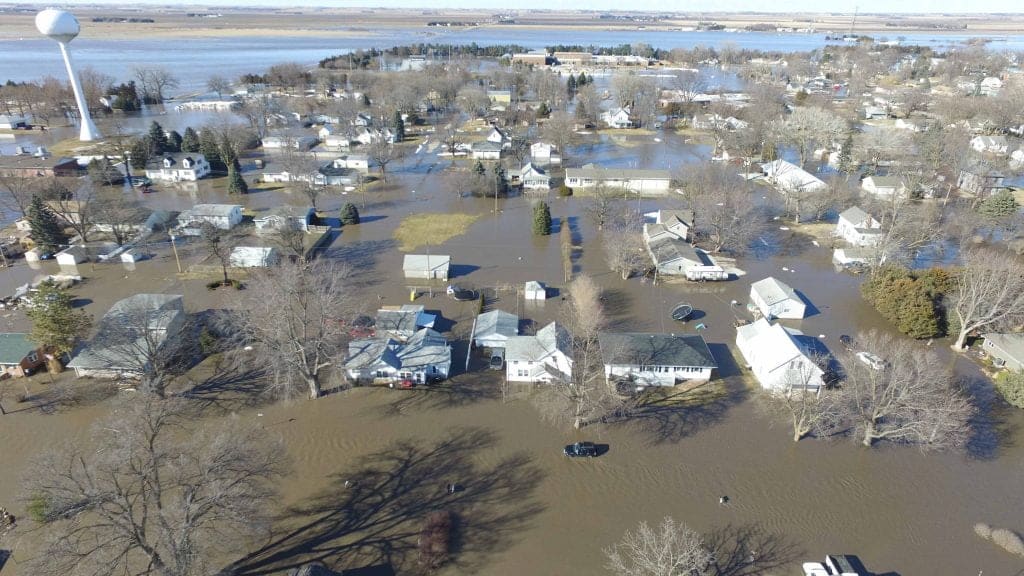
An aerial shot of flood waters in North Bend, Nebraska, on March 15, 2019. Photo credit: Justin Mensik of North Bend.
LINCOLN, Neb. – With recent storms and significant flooding impacting much of the state, Nebraska Corn is thankful for the outpouring of support at the local and national levels and said there are still opportunities for farmers to help in relief efforts.
During their next visit to their local grain elevators, farmers can donate proceeds from their grain sales to the Nebraska Farm Bureau Foundation’s Disaster Relief Fund or the Nebraska Cattlemen Foundation. At the farmers’ discretion, grain elevators across the state will be able to collect and disperse the donations to the Nebraska Farm Bureau Foundation or the Nebraska Cattlemen Foundation. Both of these disaster assistance programs are designed to help local farmers and ranchers by providing 100% of donations to those who need them the most.
“Farmers often help out neighbors in need,” said Dan Nerud, farmer from Dorchester and president of the Nebraska Corn Growers Association. “These relief programs are great ways to extend the generosity of our producers. Farmers can simply deliver grain to their local elevator and designate the entire load or a percentage of the load to relief efforts. Farmers will get a receipt for their contribution and 100% of the dollars from the sale of that grain will go to help their neighbors in need.”
Interested donors can also help rural farmers and ranchers by making direct donations to the Nebraska Farm Bureau Foundation or the Nebraska Cattlemen Foundation. Checks can be sent to the following addresses:
Nebraska Farm Bureau Foundation
Attn: Disaster Relief Fund
P.O. Box 80299
Lincoln, NE 68501-0299
Make checks payable to: Nebraska Farm Bureau Foundation
Nebraska Cattlemen Disaster Relief Fund
4611 Cattle Drive
Lincoln, NE 68521
Make checks payable to: Nebraska Cattlemen Disaster Relief Fund
“Recent storms and flood waters have been devastating, and it’s difficult to imagine what impacted farmers, ranchers and rural residents are going through,” said David Bruntz, farmer from Friend and chairman of the Nebraska Corn Board. “Fortunately, those involved in agriculture help those who are down on their luck. It’s impossible to undo what has happened, but when we all come together, we can make the devastation easier for many Nebraska families. We appreciate everyone’s efforts and contributions in keeping #NebraskaStrong.”
The Nebraska Corn Board is funded through a producer checkoff investment of ½-cent-per-bushel checkoff on all corn marketed in the state and is managed by nine farmer directors. The mission of the Nebraska Corn Board is to promote the value of corn by creating opportunities.
The Nebraska Corn Growers Association (NeCGA) is a grassroots commodity organization that works to enhance the profitability of corn producers. NeCGA has more than 2,400 dues-paying members in Nebraska. NeCGA is affiliated with the National Corn Growers Association, which has more than 40,000 dues-paying members nationwide.
Related Articles
Nebraska Corn Farmers To Invest Nearly $3.1 Billion to Plant 9.85 Million Acres
Nebraska corn farmers will plant 9.85 million acres of corn in 2024 according to the March Prospective Plantings report released by the U.S. Department of Agriculture (USDA). If these planting estimates hold up, Nebraska [...]
Grain Safety Takes Center Stage: Nebraska Corn Board and Nebraska Soybean Board Promote Stand Up 4 Grain Safety Week
The Nebraska Corn Board (NCB) and Nebraska Soybean Board (NSB) have partnered together for the 2024 Stand Up 4 Grain Safety Week because everyone deserves to go home from work each day. The goal [...]

